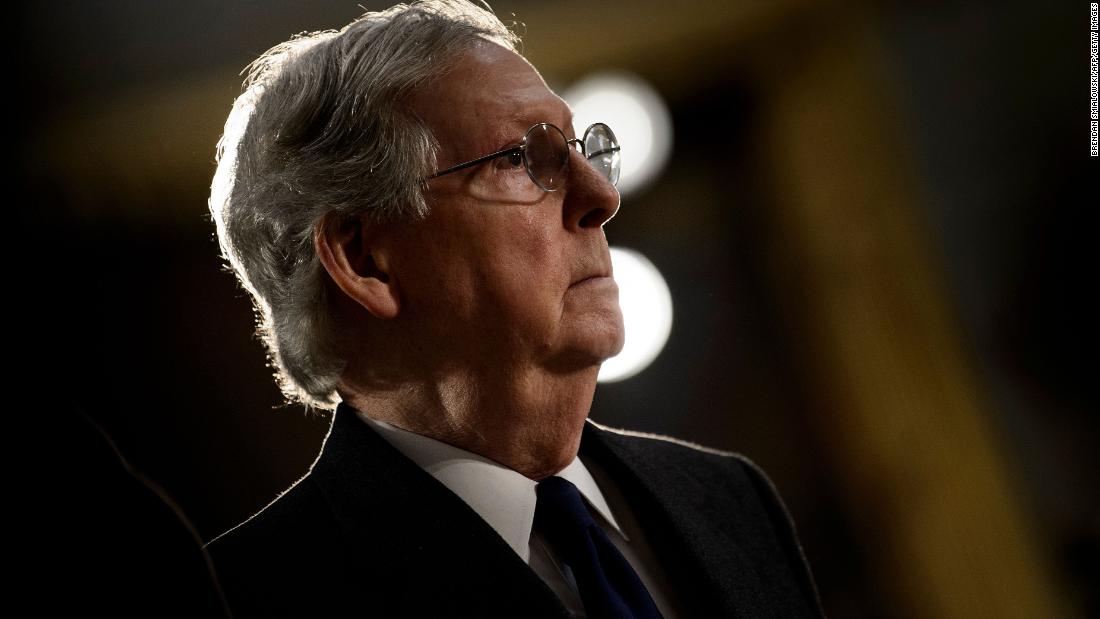
The measure needs 60 votes to pass. GOP leaders expect most of their 53 Republicans to vote for it, but it remains unclear how many Democrats will since many are broadly supportive of bringing troops home, even if they are skeptical of the way Trump's wants to rapidly pull out.
That said, several Democratic senators and aides told CNN they expected the measure to get enough votes to break a filibuster.
The vote comes as Republicans are deeply skeptical about Trump's approach to foreign policy and wary he is pulling America off the world stage at a time US leadership is needed most. They don't want to withdraw troops from countries where threats from terrorists remain strong, despite ongoing efforts that have diminished their power.
"I've been clear about my own views on these subjects," McConnell said during a floor speech. "I believe the threats remain. ISIS and al Qaeda have yet to be defeated. And American national security interests require continued commitment to our missions there."
The amendment is non-binding but carries a blunt message to the commander-in-chief: "The on-going fight against these groups, without effective, countervailing efforts to secure gains in Syria and Afghanistan, could allow terrorists to regroup, destabilize critical regions, and create vacuums that could be filled by Iran or Russia to the detriment of United States interests and our allies," that amendment states.
Sen. John Thune of South Dakota, the second-ranking GOP leader, said Wednesday the public rebuke of Trump's national security policies was needed because efforts to persuade him privately had failed.
"I think a number of our members, as you know, talk to the President on fairly regular basis and have articulated to him that they think the policies that the wants to employ with regard to Syria, for example, are not the right ones. That's being conveyed," Thune said.
Thune was also critical of Trump attacking his intelligence chiefs who testified this week that Trump's public comments on a variety of national security issues were out of step with their professional assessments.
Republican Sen. John Cornyn of Texas said he would support McConnell's amendment. He said of the message it sends to Trump: "That we're a coequal branch of government and have coequal responsibility for foreign relations."
The amendment is attached to a Middle East policy bill, known as the Strengthening America's Security in the Middle East Act, which wraps together five bills into one package. It includes new sanctions against Syria's central bank and individuals providing support for the Syrian government. It boosts military support for Israel and Jordan, two US allies that are Syria's neighbors. And makes it easier for states and localities to approve laws to combat the Boycott, Divestment and Sanctions movement against Israel.
Democrats are divided on the BDS component of the bill, some saying it impinges on free speech rights of Americans to support boycott efforts against Israel for its treatment of Palestinians and other concerns.
They complain that the Republicans purposefully added that provision to a package that otherwise has bipartisan support to put political pressure on Democrats.
"They have taken a bill that had broad -- maybe unanimous bipartisan support -- and tried to turn it into a political weapon," said Sen. Chris Van Hollen, a Maryland Democrat in a floor speech Tuesday. "In the process, they are doing a great disservice to the American people and to all of us who value the tradition of strong bipartisan support for our friend and ally, Israel."
A final vote on the overall bill is not expected before next week.
For the second straight day, McConnell blasted unnamed Democrats for filibustering his amendment, and suggested Democrats -- particularly those making a presidential run in 2020 -- were reluctant to vote for a measure that opposed bringing troops back home, something that's a priority for many Democratic voters.
"I guess some Senate Democrats didn't want to vote on these important subjects. Perhaps it could have put some of my colleagues with aims beyond the Senate at odds with parts of the far left," McConnell said.
But Sen. Jon Tester, a Montana Democrat, predicted Wednesday that many Democrats would vote for the measure.
"I think we do agree with the President that the quicker we can get out of Syria the better, but it has to be with a plan, and if it is not with a plan, then it would be a huge mistake," Tester said.
Potential 2020 candidate Sen. Bernie Sanders said he opposes the McConnell troops pullout amendment but also opposes the way Trump is pulling troops out without consulting allies and having a sensible withdrawal.
"We've been there for too long and we've got to get out," Sanders said. "My concern is, what McConnell is saying is 'let's maintain the status quo.' We've been in Afghanistan for 18 years, maybe we'll be there another 18 years, I don't know. That doesn't make any sense to me, so I'm going to vote 'no' on that. On the other hand, while Trump is talking about getting us out, he's doing it -- as usual -- in an abrupt way, without consulting with our allies, without developing a mechanism for a sensible withdrawal. So, I have problems with what Trump is doing. But I certainly have problems with what McConnell is proposing."
No comments:
Post a Comment